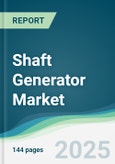The shaft generator market is poised for notable advancement across the forecast period, propelled by surging electricity requirements met through streamlined and economical power generation methodologies, the broadening scope of marine operations, and heightened emphasis on emission mitigation. Shaft generators, electrically coupled directly to the rotating shafts of prime movers such as steam turbines, gas turbines, or diesel engines, transform mechanical rotation into electrical output. This configuration obviates standalone engine-driven generators, yielding reductions in system mass, spatial demands, and operational inefficiencies. Predominant deployments span the marine sector, power generation frameworks, and diverse industrial processes, where integration with extant machinery enhances overall system efficacy.
A principal growth catalyst resides in the marine industry's escalating electrical power needs, which are increasingly addressed via shaft generators. Maritime operations - encompassing navigation, communication, and cargo management - depend critically on reliable onboard electricity. Conventional generator sets entail elevated fuel usage and exhaust outputs, whereas shaft generators leverage propulsion engine rotation to produce power, substantially curtailing consumption and environmental impact. Typically interfaced with the main engine through a gearbox, these units enable electricity generation synchronous with shaft propulsion in cargo vessels, container ships, and bulk carriers. Both new-build incorporations and retrofits of operational fleets are projected to rise, invigorating market expansion.
Geographically, the Asia-Pacific region is anticipated to secure a commanding market portion throughout the forecast horizon. The area's burgeoning maritime ecosystem, centered in China, Japan, South Korea, and Singapore, is fostering shaft generator adoption as vessel owners prioritize sustainable, cost-optimized technologies. Regional initiatives underscore this trajectory: the Chinese government's strategy for the Guangdong-Hong Kong-Macao Greater Bay Area advances maritime economic growth, ecological safeguards, and technological innovation. Japan has committed substantial funding - 2 trillion yen over five years - to autonomous shipping, intelligent maritime systems, and port upgrades. Collaborative efforts, such as those between the Korean Register of Shipping and Hyundai Heavy Industries, target advanced shaft generator designs for enhanced fuel economy and lower emissions, supported by governmental grants. These policy-driven investments and developmental synergies are set to accelerate shaft generator proliferation and regional market dominance.
Collectively, the alignment of efficiency-oriented marine electrification, emission-reduction imperatives, and Asia-Pacific's strategic maritime enhancements establishes a firm foundation for the shaft generator market's progression. This convergence positions shaft generators as vital components in optimizing auxiliary power delivery, particularly within propulsion-integrated architectures, thereby supporting broader decarbonization and operational optimization objectives in high-demand marine environments.
Key Benefits of this Report:
- Insightful Analysis: Gain detailed market insights covering major as well as emerging geographical regions, focusing on customer segments, government policies and socio-economic factors, consumer preferences, industry verticals, and other sub-segments.
- Competitive Landscape: Understand the strategic maneuvers employed by key players globally to understand possible market penetration with the correct strategy.
- Market Drivers & Future Trends: Explore the dynamic factors and pivotal market trends and how they will shape future market developments.
- Actionable Recommendations: Utilize the insights to exercise strategic decisions to uncover new business streams and revenues in a dynamic environment.
- Caters to a Wide Audience: Beneficial and cost-effective for startups, research institutions, consultants, SMEs, and large enterprises.
What can this report be used for?
Industry and Market Insights, Opportunity Assessment, Product Demand Forecasting, Market Entry Strategy, Geographical Expansion, Capital Investment Decisions, Regulatory Framework & Implications, New Product Development, Competitive Intelligence.Report Coverage:
- Historical data from 2022 to 2024 & forecast data from 2025 to 2030
- Growth Opportunities, Challenges, Supply Chain Outlook, Regulatory Framework, and Trend Analysis
- Competitive Positioning, Strategies, and Market Share Analysis
- Revenue Growth and Forecast Assessment of segments and regions including countries
- Company Profiling (Strategies, Products, Financial Information, and Key Developments among others.
Shaft Generator Market Segmentation:
- SHAFT GENERATOR MARKET BY ENGINE TYPE
- MC Engine
- ME Engine
- SHAFT GENERATOR MARKET BY MOUNTING TYPE
- Front-End Mounting
- Aft-End Mounting
- SHAFT GENERATOR MARKET BY TECHNOLOGY
- Permanent Magnet Technology
- IGBT (Insulated Gate Bipolar Technology)
- SHAFT GENERATOR MARKET BY VESSEL TYPE
- Cargo Vessel
- Bulk Carrier
- Container Ship
- Others
- SHAFT GENERATOR MARKET BY GEOGRAPHY
- North America
- USA
- Canada
- Mexico
- South America
- Brazil
- Argentina
- Others
- Europe
- Germany
- France
- United Kingdom
- Spain
- Others
- Middle East and Africa
- Saudi Arabia
- UAE
- Israel
- Others
- Asia-Pacific
- China
- India
- Japan
- South Korea
- Indonesia
- Thailand
- Others
- North America
Table of Contents
Companies Mentioned
The companies profiled in this Shaft Generator market report include:- ABB Ltd
- Alconza
- Nidec Corporation
- Taiyo Electric Co. Ltd
- VEM GmbH
- Wärtsilä
- Everllence (Volkswagen Group)
- RENK Group AG
- Kongsberg Maritime
- WE Tech Solutions Oy








